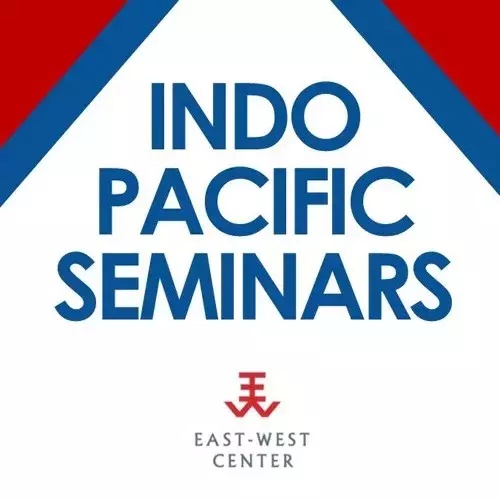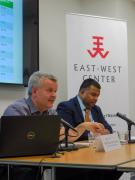Error message

OFFICE/DEPARTMENT
Neither Decline nor Displacement: America’s Trade Success with Southeast Asia
An Indo-Pacific Political Economy and Trade Seminar featuring:
Dr. Malcolm Cook
Senior Fellow,
ISEAS-Yusof Ishak Institute
Dr. Satu P. Limaye (Moderator)
Vice President, East-West Center &
Director, East West Center in Washington
Reality and narrative are not the same. This is particularly the case when it comes to America’s current trade relations with the ten economies of Southeast Asia. A predominant narrative approaching the level of a conventional wisdom is that the United

States is a declining economic power in Southeast Asia and is being displaced by the People’s Republic of China. The impressive stock and continuing inflows of US FDI into the region are often used as a counter to these declinist claims, while aggregate trade figures are used to bolster them. However, a closer look at US trade with the ten Southeast Asian economies from 2013 to 2018 clearly show that the US is neither a declining economic power in Southeast Asia nor is it being displaced by the People’s Republic of China. Instead, the US is an increasingly important export market for all ten Southeast Asian economies, an increasingly important trading partner for all but Brunei Darussalam and the Philippines, and an important source of imports for at least five Southeast Asian economies. America’s trade with Southeast Asia is growing in absolute and relative terms despite the absence of bilateral or regional preferential trade agreements linking the world’s largest economy to one of the world’s most dynamic regions. Dr. Cook recently wrote about this topic in the East-West Center in Washington's Asia Pacific Bulletin series.
For more images, please visit the album for this event on the East-West Center's Flickr page.
SPEAKER BIOGRAPHIES
Dr. Malcolm Cook is a Senior Fellow at ISEAS-Yusof Ishak Institute in Singapore. From 2003 to 2010, he was the inaugural East Asia Program Director at the Lowy Institute for International Policy in Sydney and then the inaugural Dean of the School of International Studies at Flinders University in Adelaide. Before that, he was a lecturer at Ateneo de Manila University in the Philippines. Malcolm has worked in Japan, South Korea, the Philippines, Australia, and Singapore. His seminar is based on a recently written Asia Pacific Bulletin for the East West Center and an ISEAS Perspective for the ISEAS-Yusof Ishak Institute on this counter-intuitive research.
Satu Limaye is Vice President of the East-West Center and the Director of the East-West Center in Washington where he created and now directs the Asia Matters for America initiative and is the founding editor of the Asia Pacific Bulletin. He is also a Senior Advisor at CNA Corp (Center for Naval Analyses) and Senior Fellow on Asia History and Policy at the Foreign Policy Institute at Paul H. Nitze School of International Studies (SAIS). He is a magna cum laude and Phi Beta Kappa graduate of Georgetown University and received his doctorate from Oxford University (Magdalen College) where he was a George C. Marshall Scholar. Dr. Limaye publishes and presents on a range of Indo-Pacific issues. Recent publications include: Raging Waters: China, India, Bangladesh and Brahmaputra River Politics (with Nilanthi Samaranayake and Joel Wuthnow); Why ASEAN is Here to Stay and What that Means for the US; The United States-Japan Alliance and Southeast Asia: Meeting Regional Demands; and Weighted West: The Indian Navy’s New Maritime Strategy, Capabilities, and Diplomacy.
Neither Decline nor Displacement: America’s Trade Success with Southeast Asia
An Indo-Pacific Political Economy and Trade Seminar featuring:
Dr. Malcolm Cook
Senior Fellow,
ISEAS-Yusof Ishak Institute
Dr. Satu P. Limaye (Moderator)
Vice President, East-West Center &
Director, East West Center in Washington
Reality and narrative are not the same. This is particularly the case when it comes to America’s current trade relations with the ten economies of Southeast Asia. A predominant narrative approaching the level of a conventional wisdom is that the United

States is a declining economic power in Southeast Asia and is being displaced by the People’s Republic of China. The impressive stock and continuing inflows of US FDI into the region are often used as a counter to these declinist claims, while aggregate trade figures are used to bolster them. However, a closer look at US trade with the ten Southeast Asian economies from 2013 to 2018 clearly show that the US is neither a declining economic power in Southeast Asia nor is it being displaced by the People’s Republic of China. Instead, the US is an increasingly important export market for all ten Southeast Asian economies, an increasingly important trading partner for all but Brunei Darussalam and the Philippines, and an important source of imports for at least five Southeast Asian economies. America’s trade with Southeast Asia is growing in absolute and relative terms despite the absence of bilateral or regional preferential trade agreements linking the world’s largest economy to one of the world’s most dynamic regions. Dr. Cook recently wrote about this topic in the East-West Center in Washington's Asia Pacific Bulletin series.
For more images, please visit the album for this event on the East-West Center's Flickr page.
SPEAKER BIOGRAPHIES
Dr. Malcolm Cook is a Senior Fellow at ISEAS-Yusof Ishak Institute in Singapore. From 2003 to 2010, he was the inaugural East Asia Program Director at the Lowy Institute for International Policy in Sydney and then the inaugural Dean of the School of International Studies at Flinders University in Adelaide. Before that, he was a lecturer at Ateneo de Manila University in the Philippines. Malcolm has worked in Japan, South Korea, the Philippines, Australia, and Singapore. His seminar is based on a recently written Asia Pacific Bulletin for the East West Center and an ISEAS Perspective for the ISEAS-Yusof Ishak Institute on this counter-intuitive research.
Satu Limaye is Vice President of the East-West Center and the Director of the East-West Center in Washington where he created and now directs the Asia Matters for America initiative and is the founding editor of the Asia Pacific Bulletin. He is also a Senior Advisor at CNA Corp (Center for Naval Analyses) and Senior Fellow on Asia History and Policy at the Foreign Policy Institute at Paul H. Nitze School of International Studies (SAIS). He is a magna cum laude and Phi Beta Kappa graduate of Georgetown University and received his doctorate from Oxford University (Magdalen College) where he was a George C. Marshall Scholar. Dr. Limaye publishes and presents on a range of Indo-Pacific issues. Recent publications include: Raging Waters: China, India, Bangladesh and Brahmaputra River Politics (with Nilanthi Samaranayake and Joel Wuthnow); Why ASEAN is Here to Stay and What that Means for the US; The United States-Japan Alliance and Southeast Asia: Meeting Regional Demands; and Weighted West: The Indian Navy’s New Maritime Strategy, Capabilities, and Diplomacy.









